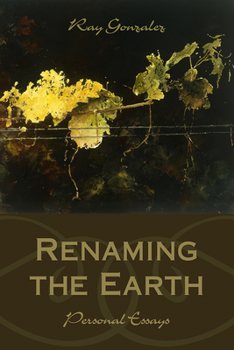Renaming the Earth: Personal Essays
In his distinctive and spirited way, Ray Gonzalez, the well-known essayist, poet, fiction writer, and anthologist, reflects on the American Southwest--where he was raised and to which he still feels attached (even though he has lived much of his life elsewhere). It is a place that tugs at him, from its arid desert landscapes to its polyglot cities--part Mexican, part Anglo, part something in-between--always in the process of redefining themselves. Nowhere does the process of redefinition hit Gonzalez quite as hard as in his native city of El Paso, Texas. There he finds the "segregated little town of my childhood" transformed into "a metropolis of fast Latino zip codes . . . a world where the cell phone, the quick beer, the rented apartment, and the low-paying job say you can be young and happy on the border." Readers will wonder, along with the author, whether life along the "new border" is worth "the extermination of the old boundaries." But there is another side of the Southwest for this "son of the desert"--the world of dusty canyons, ponderosa pines, ocotillo, and mesquite. Here, he writes, "there is a shadow, and it is called ancient home--structures erased from their seed to grow elsewhere, vultured strings searching for a frame that stands atop history and renames the ground." Rooted in the desert sand and in the banks of the Rio Grande, the muddy river that forms the border between nations, these essays are by turns lyrical, mournful, warm to the ways of the land, and lukewarm to the ways of man.
Format:Paperback
Language:English
ISBN:0816524076
ISBN13:9780816524075
Release Date:October 2008
Publisher:University of Arizona Press
Length:216 Pages
Weight:0.68 lbs.
Dimensions:0.5" x 6.0" x 9.1"
Customer Reviews
1 rating
El Paso native's essays describe his struggle for understanding
Published by Thriftbooks.com User , 16 years ago
In Ray Gonzalez's "Renaming the Earth: Personal Essays" (University of Arizona Press, hardcover $34.95; paperback $17.95), we are treated to the award-winning poet's exploration of his development as a writer. The essays are as lyrical as they are hard-headed. For example, in "A Break with the Past," Gonzalez explores his relationship with the source of much of his writing: "I drive around aimlessly in my hometown because my hometown is gone. El Paso is no longer the city I grew up in -- this statement is one of the most common and initial perceptions anyone who returns home usually has, whether is it expressed to others or left in the mind of the native who has been gone a long time." It is his duty, as a writer, to capture his hometown in words, but he struggles mightily: "If I keep writing about the same things, over and over, what have I failed to say? What am I unable to approach about El Paso? What am I unable to escape?" Gonzalez cannot answer his own questions, but accepts this truth: "My hometown is gone, and I wander through a different El Paso, loving it as I have never loved it before and wishing the ghosts of history could re-enact every lost detail I need for my writing." At other times, Gonzalez presents the unvarnished reality of the business of poetry, or "po-bizz," as he dubs it. In "Get on the Poetry Bus," he recounts such Sisyphean attempts to promote poetry as doing public readings (where only one person comes to listen), writing innumerable blurbs for the backs of other poets' books, or slogging through slush piles of poems submitted to a literary journal or poetry contests. It is only when he goes on retreat that he can get back to his calling: "For five days in the summer, I am a writer again," he says. "Not only do I produce new poems and dozens of pages of prose, but I immerse myself in a deep isolation that during the week is sometimes hard to take." In the title essay, Gonzalez scrutinizes his role as a person who uses words to "rename" his surroundings: "As a young man, I made the mistake of not renaming familiar territory in order to give it new life that would keep me going as a son of the desert and as a writer." In this way, he encapsulates the writer's ultimate goal and unremitting dilemma. Indeed, Gonzalez conflates literary expression with his very identity as a "son of the desert." In "How to Treat People Who Have Harmed You," Gonzalez sometimes sounds like an old-timer who cannot understand why young folks fail to appreciate his rock idols -- Jimi Hendrix, the Who, Jefferson Airplane, Buffalo Springfield. Yet in the same piece, Gonzalez revisits his difficult relationship with his father, who never seemed to "get" his son's literary talent and success. It takes a chance discussion with his uncle Joe to learn that his father is, in fact, proud of Gonzalez. The eight essays that make up "Renaming the Earth" ebb and flow, touching on topics as diverse as childhood embarrassments, El Paso history, d





